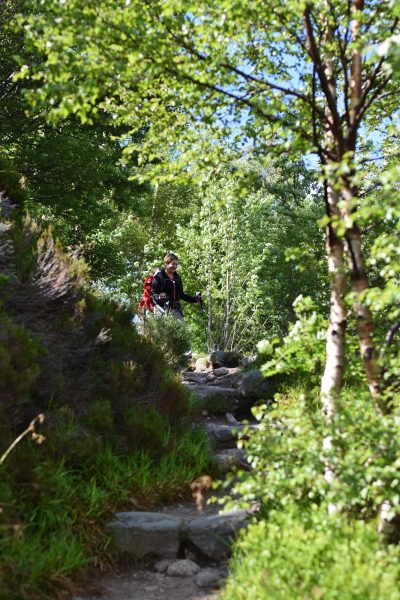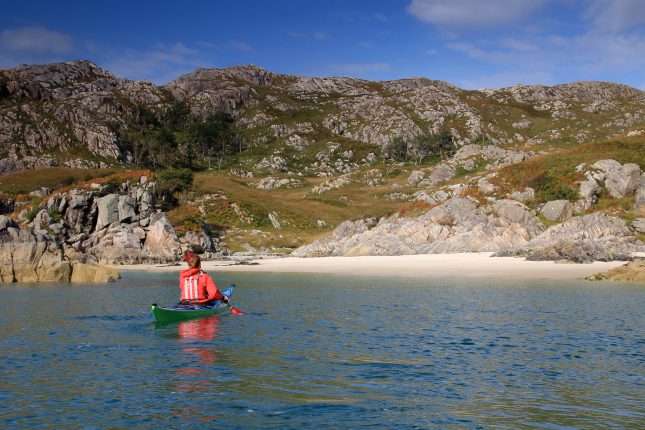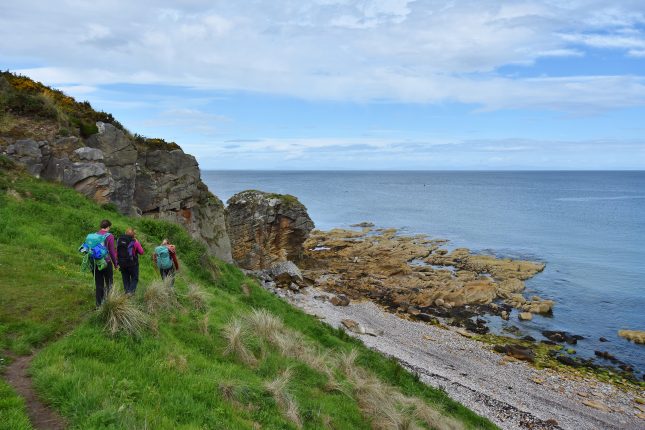Mental Health and Being Active in the Outdoors
Mental health awareness week is a great opportunity for having interesting and meaningful conversations around what mental health is and how we can look after it the same way we would our physical health.
Given that Glenmore Lodge’s purpose since its founding has been to help individuals ‘discover their physical, mental and spiritual potentialities’, many of us are passionate about the benefits of being active in the outdoors for our mental wellbeing. There’s a lot of science behind why physical activity and nature are beneficial to us; but doing what’s good for you is always easier said than done. Particularly when someone is feeling low or struggling with their mental health, getting out and active in the outdoors can be an incredibly difficult thing to do.
Physical activity can improve your mental wellbeing by making you feel tired, leading to a better night’s sleep. It also makes your body release chemicals such as endorphins that make you feel good, and cortisol which helps to manage your stress levels (About physical activity – Mind). Alongside this, many people find that being in nature is a relaxing means to get away from the pressures of everyday life. There are lots of fun and interesting ways to experience the benefits of both by finding ways to be active in the outdoors that work well for you. Not everyone enjoys the same things or experiences challenge in the same way, but taking the time to find outdoor activities that bring you satisfaction and fulfilment is a great strategy for taking care of your mental and physical wellbeing. Here are a few interesting things to consider when reflecting on how we think about physical activity in the outdoors and what it might mean to you or other people.

Small steps
Paying attention to our mental health the same way we would our physical health can be a tricky thing to learn, but when you recognise that you’re feeling low or defeated by something, breaking it down into more manageable components can help. Taking small steps towards improvement will look different to everyone. It might mean going for a slightly longer walk after work, or if you’ve been struggling with a new challenge that you’ve set your sights on, it could be a matter of practicing a technique little and often. Regardless of your situation, most of us experience doubts about our ability levels and can find it hard to set them aside when considering something daunting.
‘Challenging’ yourself
Taking smaller steps is helpful when you’ve thought about or looked at doing something that your brain has decided is a ‘challenge’. Part of what can make being physically active in the outdoors so rewarding and beneficial for us is the sense of overcoming an obstacle. A keen hillwalker might tell you that few things beat the satisfaction of reaching the summit of a Munro.
Sometimes seeing the amazing things that humans can achieve can be really inspiring, helping to motivate you to get out and work towards going on your own adventures and pushing the limits of your current comfort zone or ability level. But not everyone finds inspiration in the impressive feats of others; it isn’t uncommon to feel demoralised. Comparing yourself to others is something everyone is a bit guilty of and depending on the relationship you have with physical activity and your self-esteem, comparison can often lead people to retreat within their comfort zone.
There is no impartial standard governing what does or doesn’t qualify as a ‘challenge’. Depending on people’s confidence levels, experiences, and abilities, everyone will have a different idea of what a ‘challenge’ will look like to them. It’s often good to try and avoid getting caught up in comparing other people’s achievements with your own and taking pride in overcoming the things that you find difficult.

Slowing it down
For some, part of what makes a lot of outdoor activities like hillwalking, paddling, climbing or mountain biking so enjoyable is that they’re often about enjoying the journey rather than just reaching an end destination. It can offer a nice change of pace from everyday life, which can sometimes feel hectic and out with our control. When you’re out in the outdoors, it’s worthwhile occasionally taking the time to slow your pace and really take in the environment around you. A lot of the activities we enjoy at Glenmore Lodge enable us to go to some truly amazing places, which for many are a big part of why we do those things. Getting out into these wild locations can be a great way to get perspective on things and clear your head.
Talking
Everyone has a unique understanding of their own physical and mental wellbeing, and their own relationship between these and the outdoors. There’s no one-size fits all approach, but there’s often a surprising amount to be learned from having honest conversations with other people who can offer you a new perspective on things. A lot of outdoor pursuits are quite sociable activities, whether by necessity or preference, this creates opportunities for making friends where you didn’t expect to or enjoy the company of those you’ve known for years. Being out and about and focused on the task at hand can be a great way to distract yourself and let things that have been worrying you or getting you down fall to the wayside.

Getting out there
We’re incredibly fortunate to have such special landscapes on our doorstep, and they inspire many of us to get out in pursuit of adventure and new challenges. Other times, the forests and mountains can be daunting, and it’s a victory to go for a short walk from your front door. When it comes to being active in the outdoors and gaining all there is to benefit from doing so, it’s worth remembering that it doesn’t have to look the same for everyone. The scientific evidence of why being active in the outdoors is good for our mental wellbeing is all very substantial and impressive, but few things compare to getting out there and experiencing the rewards for yourself, regardless of what that looks like for you. Outdoor activities like walking, climbing, paddling, and biking can offer a great range of both physical and mental challenges that require you to put trust in yourself, your abilities, and sometimes other people to be able to work out well. So, if it takes you small steps to overcome the challenge of whatever your next adventure looks like, it’ll undeniably be well worth doing.
.
SAMH – Scottish Association for Mental Health
For further information and resources around understanding and getting help with mental health, visit SAMH’s website below